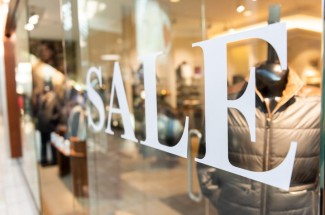Black Friday unwrapped: Smart shopping tips from an expert

Deep discounts, doorbusters and high-demand promotions.
As Thanksgiving approaches, so does one of the most highly anticipated shopping events of the year — Black Friday.
With Americans eagerly taking advantage of deals from their favorite brands, this day marks the unofficial start of the holiday shopping season. And while it’s a time for significant savings, Black Friday can also be a chaotic and competitive experience.
Adam Craig is an associate professor in the Gatton College of Business and Economics at the University of Kentucky, with a research focus on consumer behavior. In this UKNow Q&A, Craig offers valuable insights into Black Friday from the retailers’ perspective, as well as expert tips for navigating the shopping frenzy.
UKNOW: What factors have contributed to Black Friday’s reputation as a pivotal shopping day, and why does it hold such significance for both consumers and retailers?
Craig: Black Friday holds significant importance as a shopping day due to its impact on retail revenue and its cultural significance. Retailers view Black Friday as a major opportunity to boost sales — often offering discounts to attract customers and potentially turn a profit for the year. Black Friday is also widely recognized as the unofficial start of the holiday shopping season, so spending traditionally increases as consumers are more willing to open their wallets.
UKNOW: While being bombarded with so many holiday “deals,” how can consumers differentiate between genuine savings and marketing strategies?
Craig: Honestly, that’s very difficult to do if they haven’t been tracking prices already. For those who have been monitoring prices or using apps to check price histories, it’s easier to recognize a genuine deal. However, if that hasn’t been the case, the best approach is to carefully compare prices across multiple retailers. If the item isn’t an immediate necessity, and you’re unsure if the price is genuinely good, it might be wiser to wait until you can make a more informed decision.
UKOW: The holiday season is filled with enticing marketing strategies. What practical steps can shoppers take to resist these tactics and stick to their budget?
Craig: Shoppers can use several strategies to avoid overspending during the holidays. The most important are planning and budgeting in advance, setting clear spending limits and focusing on necessary items rather than impulse buys. Researching prices ahead of time ensures that “deals” are genuine and not inflated prices disguised as discounts. Awareness of retailers’ psychological tactics, such as scarcity messaging and limited-time offers, can also help shoppers resist impulsive purchases. Additionally, reducing exposure to marketing, setting time limits for shopping, and taking breaks to reconsider purchases — especially large ones — are effective approaches. For example, if you add an item to your cart, pause and revisit it later to decide if it’s something you truly need.
UKNOW: What strategies can college students use to maximize their savings and make smart purchases during Black Friday?
Craig: Make a list of what you need and set a budget. You can also use price-tracking tools such as websites, apps or browser plugins to compare prices and make sure you’re getting a real discount — as some retailers might inflate prices before marking them down. Look for student discounts, as some stores offer them on top of Black Friday deals. And remember, you might not need to wait until Black Friday itself, since retailers often start sales earlier. Most importantly, be mindful of the opportunity costs of your purchases. If you are thinking about spending money on a discounted item you don’t really need, just think about what else you could use that money for later!
UKNOW: In recent years, Black Friday has become less about getting up early and waiting in physical lines. What role does technology play in this major shopping day?
Craig: Technology can create a more convenient, personalized and data-driven experience for both shoppers and retailers. Shoppers can use the internet to instantly price-check competitors. Shoppers can also find good deals through those they follow on social media. Additionally, retailers can use their data about individual consumers to offer more personalized recommendations.
Moreover, they can adjust their prices very quickly — either increasing or decreasing a price based on how shoppers are responding. Be aware when it seems like everything is a good deal. Often, this is retailers trying to get you into a mindset where you don’t think critically about purchases and are more likely to give way to temptation.
UKNOW: Is there any benefit to holding out until after Black Friday? Will deals get even better as we get closer to the holidays?
Craig: Retailers’ performance on Black Friday and Cyber Monday can influence the quality of deals offered later in the holiday season. If sales exceed expectations, retailers may be less inclined to offer deeper discounts closer to the holidays. However, if sales fall short, shoppers might see better deals as the season progresses. While some discounts may reappear after Cyber Monday or even into the new year, tracking prices is essential to identifying genuine savings.


